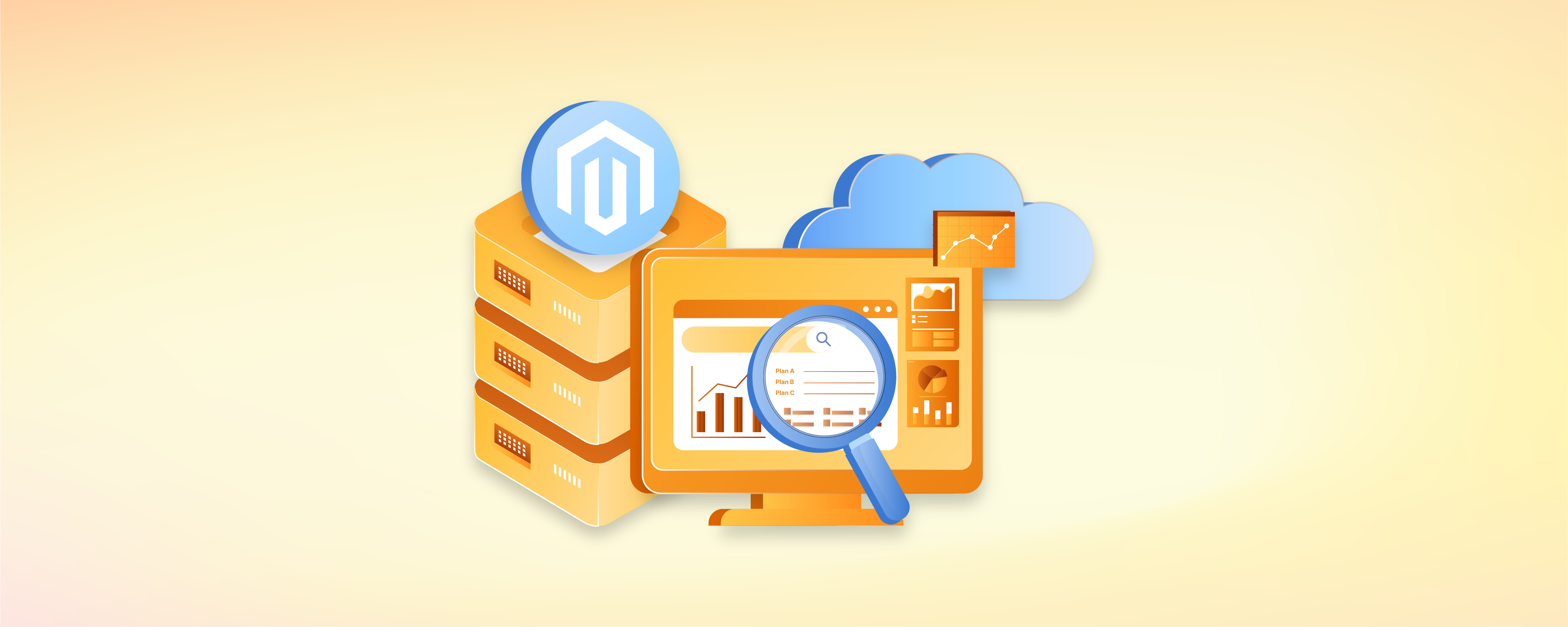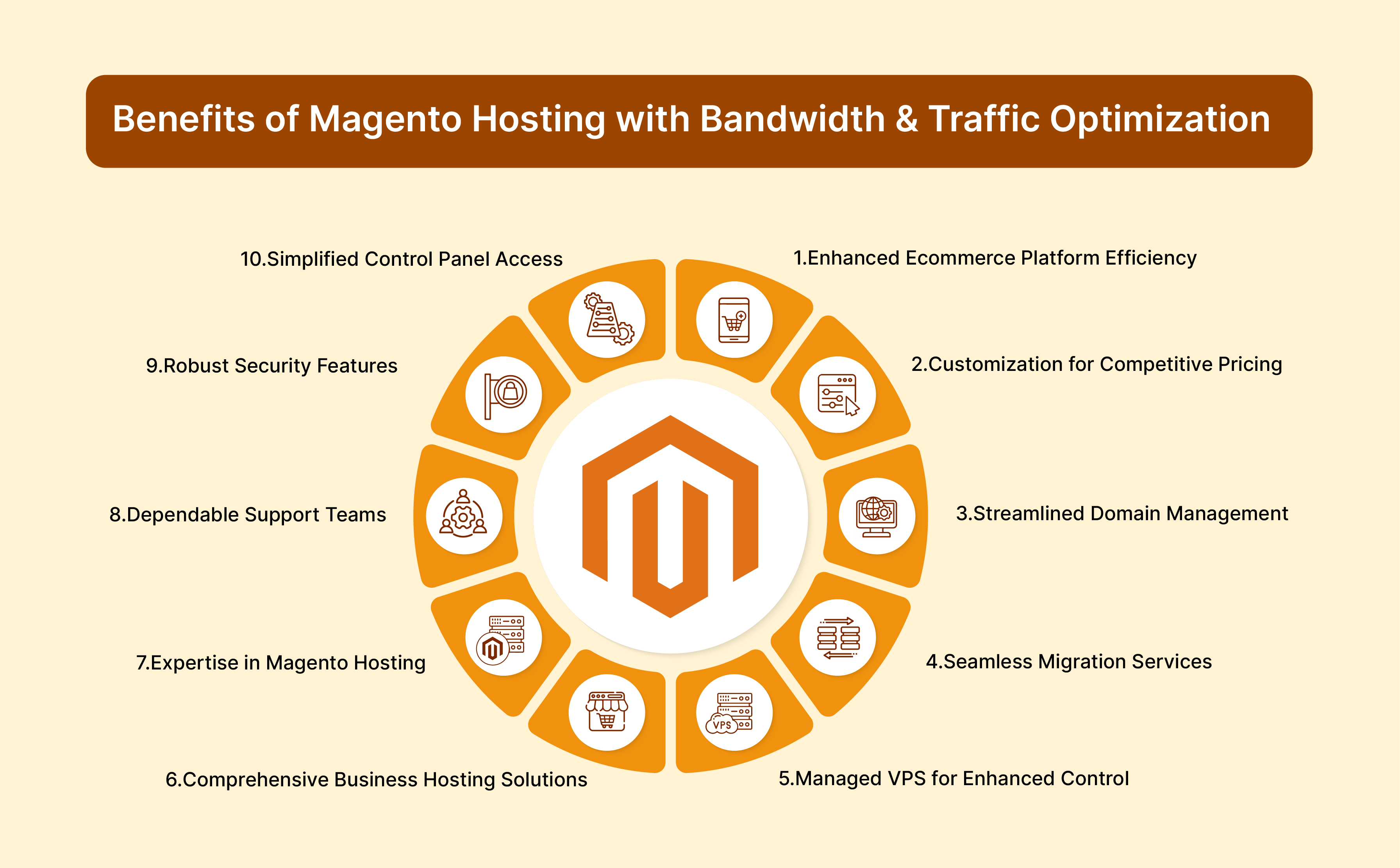
Choosing Magento Hosting Plans for Bandwidth and Traffic Needs
Looking for the right Magento hosting plans? Analysing the bandwidth and traffic requirements ensures your online store's uptime, speed, and stability. It directly affects the responsiveness of your website and subsequently impacts customer experience. This article will guide you in getting the best Magento hosting plan based on your capacity and traffic needs.
Key Takeaways
-
Optimal Magento hosting plans should balance adequate bandwidth with anticipated traffic volumes.
-
Proper bandwidth and traffic management significantly influence performance, user experience, and Magento SEO.
-
Scalability, security, and advanced features are critical components of a robust Magento hosting solution.
-
Continuous monitoring, maintenance, and security compliance safeguard store performance and customer data.
-
Managed hosting services with Magento expertise offer tailored solutions, ease of management, and dependable support.
Understanding Bandwidth and Traffic Needs

Bandwidth refers to the amount of data that can be transferred from your website server to users in a given time. It is measured in bits per second (bps). Traffic refers to the number of visitors or users accessing your Magento website.
When choosing a Magento hosting plan, it is important to understand your capacity and traffic needs. This will help you select a plan that can handle the data transfer and number of visitors to your website without causing downtime or slowing down the site.
1. Bandwidth and Data Transfer
-
The mechanics of bandwidth in web hosting: Bandwidth defines the data capacity transmitted per time over an internet connection. In web hosting, it determines how much data an e-commerce site like Magento can deliver to users. Adequate bandwidth is crucial for smooth user experiences with high-quality content like images and videos.
-
Data transfer rates and their impact on website performance: Data transfer rate (Mbps or Gbps) impacts website loading speed. Higher rates mean quicker content loading, which is crucial for customer engagement. Slow speeds can lead to bounce rates and lost sales. Choosing the right bandwidth is key in your Magento hosting plan.
2. Traffic Analysis for Magento Stores
-
Understanding different types of web traffic: Web traffic types (organic, direct, paid, referral, social) impact Magento stores differently. Understanding these behaviors is key for predicting surges, optimizing performance, and planning capacity. Promotional sales, for instance, can spike direct and paid traffic, necessitating more bandwidth.
-
Tools for measuring website traffic accurately: Using tools like Google Analytics, Magento's built-in analytics, or web traffic analysis software offers valuable insights into your site's traffic. Identify peak traffic times, popular pages, and customer behavior to optimize your Magento hosting for efficient traffic management.
How Bandwidth and Traffic Affect Magento Stores

1. User Experience
-
Smooth browsing: Adequate bandwidth ensures visitors can navigate your Magento store smoothly without experiencing delays or errors.
-
Engagement: Fast, responsive sites encourage users to explore products more, leading to better engagement metrics.
2. Page Load Times
-
Immediate access: Quick page load times are crucial for customer satisfaction; even a one-second delay can significantly impact user perception.
-
SEO impact: Search engines favor fast-loading websites, meaning better bandwidth can contribute to higher rankings, driving more organic traffic to your store.
3. Sales and Conversion Rates
-
Lower bounce rates: Sites that load quickly have lower bounce rates, as customers are less likely to abandon a page that opens promptly.
-
Higher conversions: Faster sites typically see higher conversion rates, as customers can quickly find and purchase products without frustration
4. Inventory Management
-
Real-time updates: High traffic and good bandwidth allow for real-time inventory updates, which are crucial during high-volume sales periods to prevent overselling.
-
Efficiency: Efficient bandwidth management supports backend operations, enabling faster order processing and inventory management.
5. Customer Support and Engagement
-
Live support: Adequate bandwidth ensures that live chat and customer support tools function without lag, enhancing customer service experiences.
-
Interactive features: High bandwidth supports interactive elements like product videos, 360-degree views, and customer reviews, further engaging potential buyers.
6. Security Measures
-
SSL and encryption: High traffic levels require robust security measures, like SSL encryption, which can consume additional bandwidth.
-
DDoS protection: Effective DDoS protection mechanisms, crucial for safeguarding your site against malicious traffic spikes, depend on sufficient bandwidth to filter out bad traffic.
7. Scalability and Growth
-
Future-proofing: As your Magento store grows, your bandwidth and traffic handling capabilities must scale accordingly to support increased product listings, customer data, and transaction volumes.
-
Adaptability: Adjusting bandwidth allocations to traffic fluctuations supports uninterrupted growth and sales opportunities.
Technical Evaluation of Magento Hosting Needs

1. Assessing Server Response Times
-
Importance for Magento stores: Fast server response times are essential for Magento stores to ensure quick loading of product pages and checkout processes, directly influencing customer satisfaction and retention.
-
Influence of bandwidth and traffic: Adequate bandwidth ensures that server response times remain consistent, even during periods of high traffic. Insufficient bandwidth can lead to increased response times, negatively affecting user experience.
2. Magento-Specific Hosting Requirements
-
Optimal server configurations: Magento requires a hosting environment optimized for resource-intensive operations. This includes a powerful CPU, ample RAM, and fast disk I/O capabilities to efficiently handle complex queries and operations.
-
PHP, MySQL, and other software requirements: Magento has specific requirements for PHP versions, MySQL for database management, and other software like Elasticsearch for advanced search capabilities. Ensuring compatibility with these requirements is crucial for the smooth operation of a Magento store.
3. Analyzing Peak Traffic Patterns
-
Preparing for high-traffic events: Identify historical traffic peaks and anticipate future surges related to sales or product launches. This preparation helps in scaling resources accordingly to manage increased loads.
-
Strategies for bandwidth management during traffic spikes: Implementing caching, using a Content Delivery Network (CDN), and optimizing images and assets can significantly reduce bandwidth consumption.
Additionally, scaling server resources dynamically in response to traffic increases ensures that the Magento store remains responsive and available.
Selecting the Right Magento Hosting Plan

1. Shared vs. Dedicated vs. Cloud Hosting for Magento
-
Shared Hosting: Economical but with limited resources and potential for slower response times during peak traffic. Best suited for small Magento stores with low to moderate traffic.
-
Technical limitations: Limited bandwidth and server resources can affect site performance.
-
Bandwidth and traffic accommodation: May struggle under heavy traffic spikes; not ideal for high-volume e-commerce sites.
-
Dedicated Hosting: Offers exclusive server resources, optimal for high-traffic Magento stores requiring maximum control and performance.
-
Technical advantages: Full control over server resources, leading to faster response times and greater reliability.
-
Bandwidth and traffic needs: Easily handles high traffic volumes with the possibility to scale bandwidth as needed.
-
Cloud Hosting: Provides scalability and flexibility, allowing Magento stores to adjust resources based on real-time demand.
-
Technical advantages: Scalable resources mean you can adjust for traffic spikes without paying for unused capacity during low periods.
-
Bandwidth and traffic accommodation: Ideal for handling unpredictable traffic patterns and growth.
2. Critical Hosting Features for Magento
-
SSD Storage: Significantly faster data access speeds than traditional HDDs, enhancing site performance and loading times.
-
Benefits: Faster database queries and reduced page load times improve user experience and SEO rankings.
-
Advanced Caching Mechanisms: Technologies like Varnish, Redis, and Full Page Cache can drastically improve site speed by storing copies of web pages for quick retrieval.
-
Benefits: Reduces the load on server resources and decreases response times, which is particularly important for dynamic content in Magento stores.
-
Network Uptime Guarantees: Essential for e-commerce platforms where downtime directly translates to lost sales.
-
Technical implications: High uptime guarantees (99.9% or greater) indicate reliable hosting, minimizing potential revenue loss from site outages.
3. Security Considerations
-
SSL and TLS Protocols: Encrypts data between the server and clients, securing online transactions and customer data.
-
Importance: Essential for protecting user data and building trust with customers; often a requirement for payment processors.
-
DDoS Protection and Web Application Firewalls (WAF): Protects your Magento store from malicious traffic and vulnerabilities.
-
Benefits: Prevents service disruptions from DDoS attacks and secures your site from common web exploits and vulnerabilities.
Optimizing Magento Hosting for Performance

1. Leveraging Content Delivery Networks (CDNs)
- How CDNs work with Magento: CDNs distribute a copy of your site's static content (like images, CSS, and JavaScript files) across a network of global servers. Users visiting your Magento store are served content from the nearest geographical server, significantly reducing load times.
- Selecting a CDN that complements your hosting plan: Choose a CDN that integrates seamlessly with Magento and your specific hosting environment. Consider factors like geographic coverage, cost, ease of integration, and support for dynamic content to ensure the best performance improvement.
2. Database Optimization Techniques
- Importance in Magento: Magento relies heavily on its database for storing product information, customer data, and order details. As your store grows, so does the database, making optimization crucial for maintaining fast query times and overall site performance.
- Techniques and tools for enhancement: Regularly clean up your database by removing outdated or unnecessary data. Use indexing to speed up query times. Consider using Magento's built-in tools or third-party solutions for database optimization and monitoring.
3. Implementing Effective Caching Strategies
Types of caching relevant to Magento:
-
Full Page Cache (FPC): Stores the entire HTML output of a page, dramatically reducing load times for your Magento store.
-
Varnish: An HTTP accelerator designed for content-heavy dynamic websites. It's highly effective at reducing server load and improving site speed.
-
Redis: An in-memory data structure store used as a database, cache, and message broker, ideal for session storage and page caching in Magento.
Configuring caching for optimal performance:
Proper configuration is key to leveraging the full benefits of each caching method. For Magento, this means setting up Varnish for full-page caching.
Configure Redis for session storage and backend caching. Ensure that your hosting environment supports these technologies efficiently. Additionally, regularly monitor and fine-tune your caching configurations to adapt to changes in your store's content and traffic patterns.
Future-Proofing Your Magento Hosting Solution

1. Scalability and Flexibility
-
Importance for growing Magento stores: Your hosting needs will change as your Magento store expands. Scalable solutions allow you to adjust resources like bandwidth, storage, and processing power to meet these evolving demands.
-
Ensuring flexibility: Choose a hosting provider that offers easy scalability options. Look for features like cloud hosting, which allows for real-time resource adjustments, or plans that offer seamless upgrades without downtime.
2. Monitoring and Maintenance
-
Ongoing monitoring tools: Utilize tools that provide real-time insights into your website's performance, traffic, and resource utilization. This can include custom monitoring solutions or those provided by your hosting company.
-
Best practices: Regularly update your Magento installation and extensions to their latest versions to ensure security and performance. Perform routine backups and test your site's recovery procedures to protect against data loss.
3. Security Updates and Compliance
-
Keeping software up to date: Regularly apply security patches and updates to Magento and its components. Staying current with updates is crucial for protecting your site against new vulnerabilities.
-
Compliance with standards: Ensure your hosting solution complies with industry standards and regulations, particularly if you handle sensitive customer data (e.g., PCI DSS for payment information).
4. Advanced Technologies Integration
-
Adopting new technologies: Stay informed about emerging technologies that can enhance your Magento store's performance and customer experience, such as HTTP/3, AI for customer service, or PWA (Progressive Web Apps).
-
Integration support: Your hosting provider should support the integration of these technologies, offering the necessary infrastructure and compatibility to implement them smoothly.
5. Disaster Recovery Planning
-
Importance of a recovery plan: Even with the best precautions, disasters can happen. A robust disaster recovery plan ensures you can quickly restore operations with minimal downtime.
-
Key components: Include regular backups, data redundancy, and a clear, tested procedure for restoring your site. Ensure your hosting provider offers the tools and support for effective disaster recovery.
Benefits of Magento Hosting with Bandwidth & Traffic Optimization

1. Enhanced Ecommerce Platform Efficiency
As an ecommerce platform, Magento thrives when paired with the right hosting services. Hosting designed with bandwidth and traffic optimization can handle high volumes of transactions and user traffic.
This ensures store owners can provide a seamless shopping experience without lag or downtime.
2. Customization for Competitive Pricing
Magento hosting services offer flexible pricing plans. Business owners can choose an option that aligns with their budget and business scale.
This customization in pricing allows businesses to invest in other areas. They can focus on SSL certificates and domain management to enhance their ecommerce setup.
3. Streamlined Domain Management
Having a recognizable domain name is critical for branding. Magento hosting usually comes with user-friendly control panels like cPanel.
This makes domain management easy for business owners. The simplicity ensures that even those without technical expertise can handle domain-related tasks with just a few clicks.
4. Seamless Migration Services
Magento hosting providers provide managed migration services for businesses considering upgrading to Magento 2 or migrating from another platform.
These services aim to minimize disruptions. The hosting company's support team manages the technical aspects. This allows store owners to concentrate on operating their business.
5. Managed VPS for Enhanced Control
Managed VPS hosting services simplify server hardware and software stack management.
Business owners enjoy the advantages of a private server, including enhanced security and performance. No in-depth knowledge of Apache, Nginx, or other underlying technologies is required.
6. Comprehensive Business Hosting Solutions
High-level Magento hosting services offer tailored solutions to meet business needs.
They provide recommendations for IP addresses and ensure PCI compliance for transactions. These providers add significant value to Magento stores.
7. Expertise in Magento Hosting
Dedicated Magento hosting providers have the expertise to optimize the hosting environment for Magento 2.
This involves fine-tuning the hosting stack, monitoring the server, and offering up-to-date security measures. All these elements contribute to a reliable hosting service.
8. Dependable Support Teams
Magento hosting companies' support teams excel in ecommerce application intricacies.
They offer phone and online chat assistance to address queries, resolve issues, and guide optimal Magento hosting practices.
9. Robust Security Features
Security is paramount for ecommerce businesses. Magento hosts understand this. They offer SSL certificates and secure IP addresses.
They implement strict security protocols in their data centers. This gives store owners the peace of mind they need to run their operations.
10. Simplified Control Panel Access
With Magento hosting services, server and application setup complexities are simplified.
It's done through a user-friendly control panel that offers one-click installations, updates, and management of Magento versions. This control panel access is a game-changer for users of any technical level.
FAQs
1 . What is Magento hosting?
Magento hosting is a hosting service tailored for Magento ecommerce stores. It involves fine-tuning the hosting environment, robust security measures, and expert support teams.
2. Why should I choose dedicated Magento hosting instead of regular shared hosting?
Dedicated Magento hosting providers have extensive experience and expertise in optimizing the hosting environment for Magento stores. They also provide specialized support and security measures. These are specifically tailored for ecommerce applications, making them a more reliable and secure choice than regular shared hosting.
3. Can I switch to Magento hosting from my current hosting provider?
Yes, most dedicated Magento hosting providers offer migration services to help you transfer your store seamlessly. It's always recommended to check with your potential hosting provider for their specific migration process and requirements.
4. Are there any limitations on the number of products or customers I can have with Magento hosting?
Dedicated Magento hosting providers do not limit the number of products or customers you can have in your store. Choosing a hosting plan that accommodates your expected traffic and resource needs is important.
5. Can I upgrade my hosting plan if my store grows?
Yes, most dedicated Magento hosting providers offer flexible plans. These plans can be upgraded as your store grows. It's recommended that you assess your resource usage regularly. Upgrade accordingly to ensure optimal performance for your store.
6. What are some of the best web hosting services?
Some of the best web hosting services include:
-
MGT-Commerce - Known for high uptime and fast loading speeds, ideal for e-commerce sites.
-
Bluehost - Offers affordable shared hosting with great customer support.
-
HostGator - Wide hosting options with budget-friendly pricing.
-
InMotion Hosting - Reliable performance and user-friendly interface.
-
SiteGround - Top-notch security and fast loading for websites.
-
A2 Hosting - High-speed hosting with developer-friendly features.
-
GoDaddy - A user-friendly platform with excellent customer support.
-
DreamHost - Reliable hosting with unlimited bandwidth and storage.
-
WP Engine - Specializes in WordPress hosting, perfect for WordPress websites.
Summary
Choosing the right Magento hosting plans considering bandwidth and traffic needs ensures an optimized presence in SERPs. It's essential to regularly assess your store's resource usage and upgrade accordingly to accommodate growth. The right managed Magento hosting provider can also help manage security and reliability.


